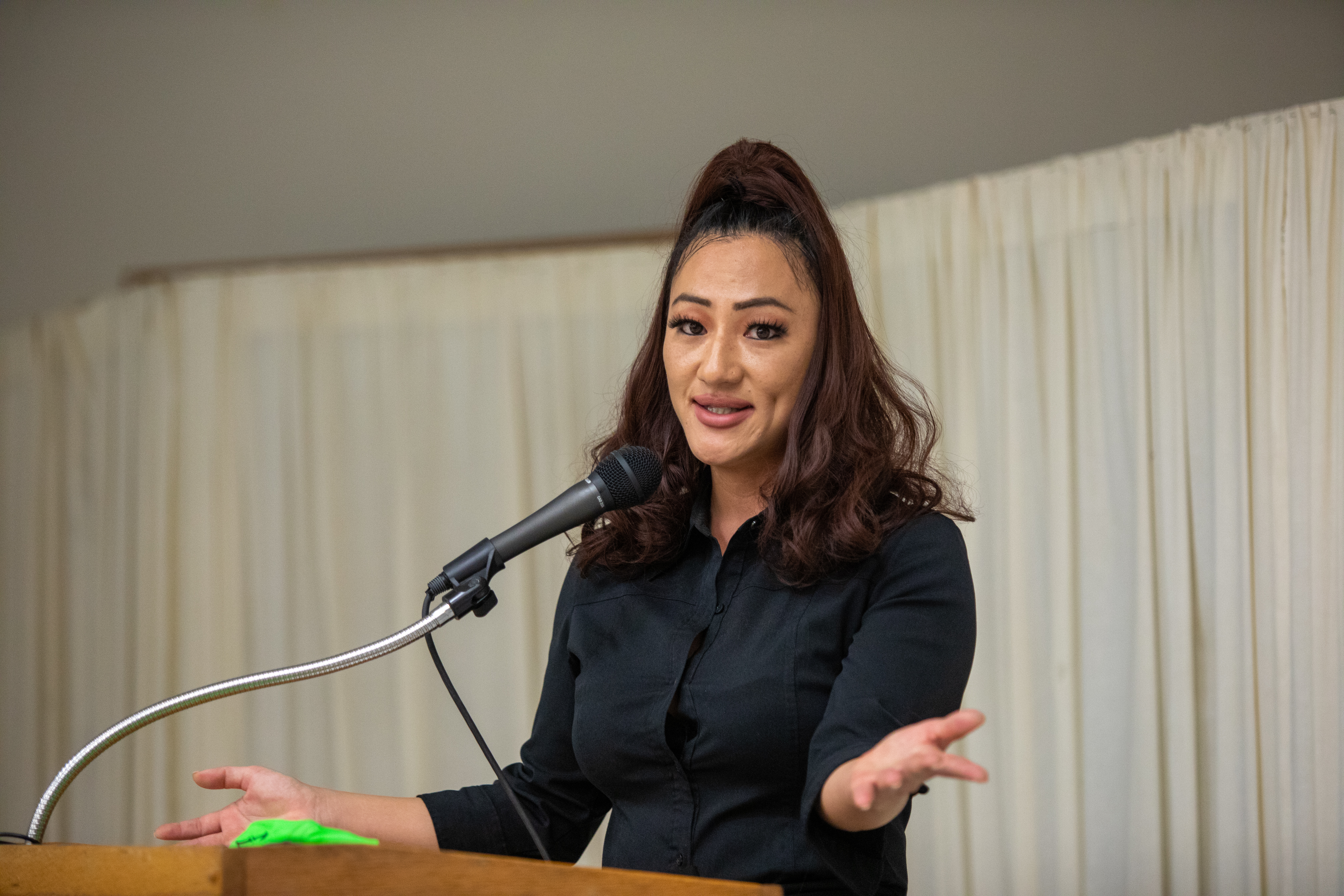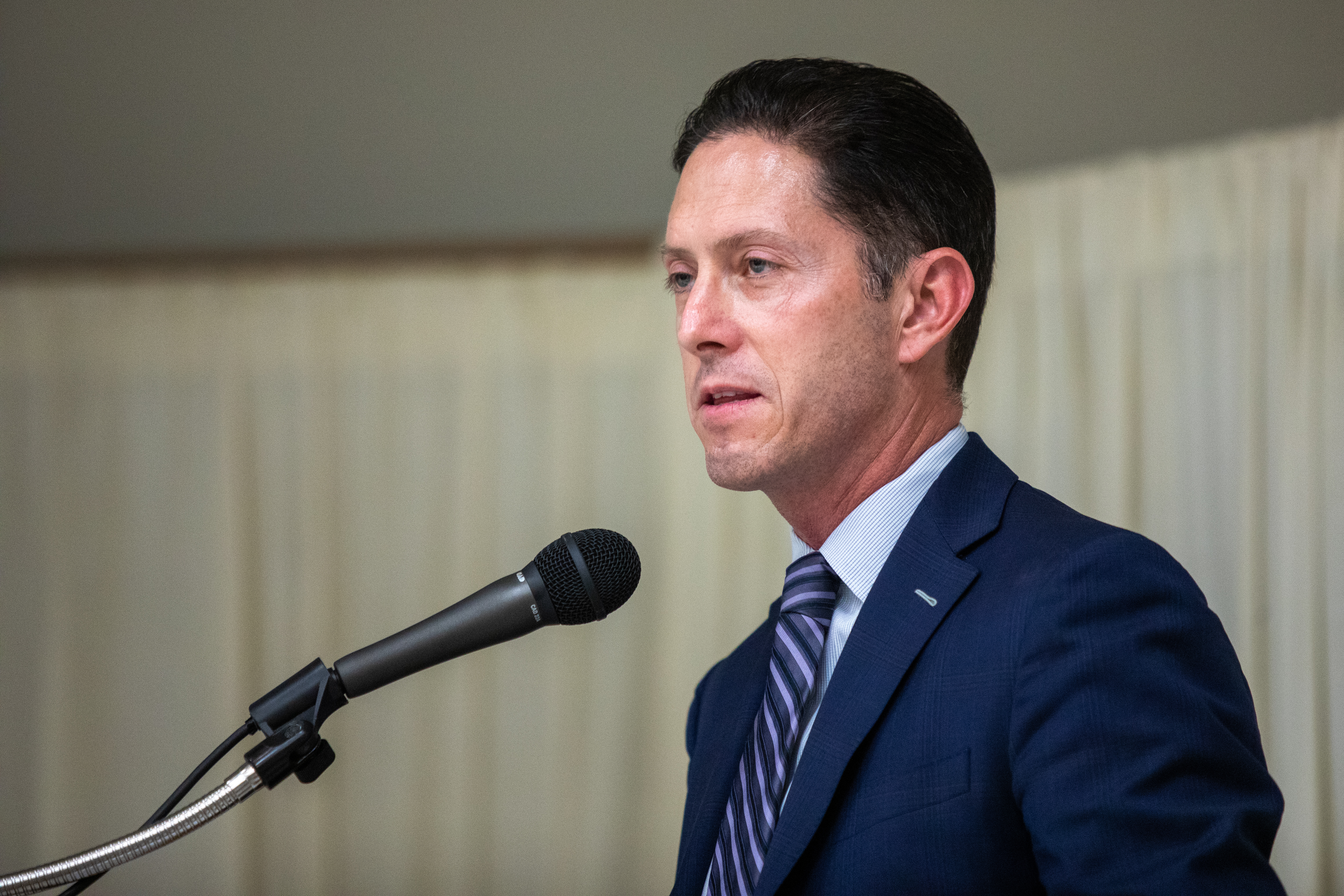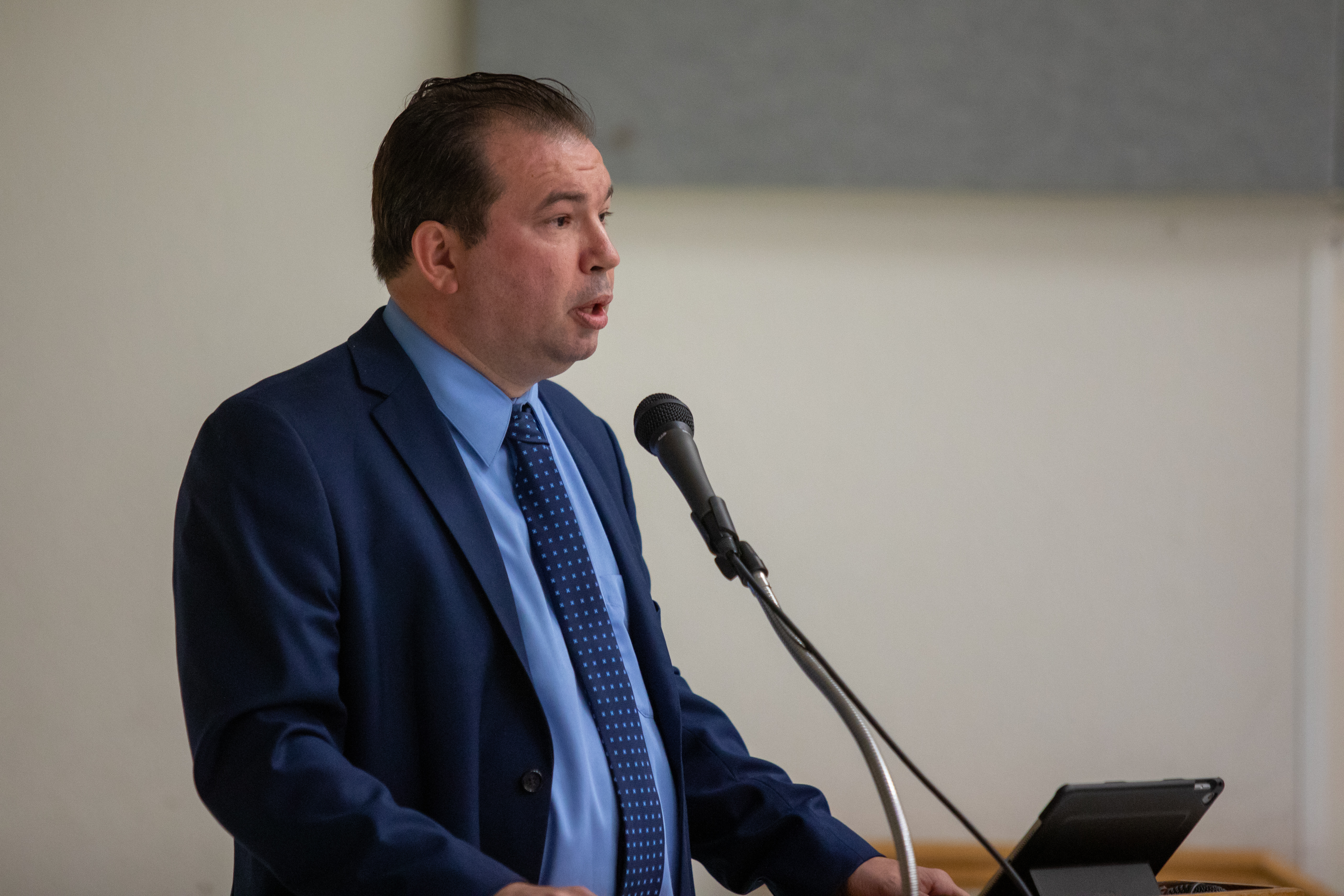

By Danielle Silva
The Vanguard hosted its 9th annual fundraiser event, featuring speakers who addressed how the prosecution system needs to be reformed.
President of the National Lawyers’ Guild Elizabeth Kim, Yolo County Deputy Public Defender and American Civil Liberties Union speaker Dean Johansson, and American Justice Alliance representative Rajendra Vora shared some words to begin the event.
Johansson stated that the prosecution system should aim to “educate, not incarcerate” and the public should grow to understand why uncontested prosecutorial races can be an issue.
Vora, on behalf of the group working with Anand Jon Alexander in the face of his wrongful conviction, shared how Anand’s case had “disturbing red flags for justice,” including judicial misconduct and race demonization from prosecutors, including withholding excpulpatory evidence of innocence for over ten years.

David Greenwald, director of the Davis Vanguard, opened the event with videos regarding the Davis Vanguard Court Watch Program and a tribute video to the late San Francisco Public Defender Jeffrey Adachi. Since 2010, the Court Watch Program has encouraged citizen journalism for monitoring court cases, often exposing everyday injustices. Adachi had been interested in the Court Watch program and the work of the Vanguard, and following his appearance at a 2013 event, considered bringing a court watch to San Francisco. Adachi had also spoken at a Vanguard event in 2016, being the keynote speaker for bail reform.
After his sudden passing earlier this year, the Vanguard and the San Francisco Public Defender’s Office began a San Francisco branch of the Court Watch program in June 2019.
David went into the background of the Vanguard and Court Watch, stating it as a blog in 2006 when he was still a graduate student at UC Davis. The foundation of the Vanguard followed a time when the police chief resigned and the Human Relations Commission was disbanded after the police and DA mishandling of a minor police incident. In 2010, he began the court watch after seeing the Ajay Dev case, a case that the Vanguard believes was a wrongful conviction nearly 10 years later.

“Not only did the Ajay Dev case lead me to the conclusion that we need to put people in the courtrooms in order to monitor and report on the courts – the foundation of our court watch programs – but it has also led to my passion for and work on behalf of those wrongly accused and wrongly convicted,” David stated.
He mentioned Maurice Caldwell, a man who served in prison for 20 years for a murder he didn’t’ commit and was denied compensation from the California Victims’ Board as he “hadn’t proven his innocence.” David also pointed to Barry Schneck, who introduced the idea of using DNA information to exonerate in addition to implicate.

David notes that in looking at cases like Maurice and Ajay, “serious deficiencies in the system” stand out. As such, the prosecution system must be reevaluated and reformed. He argues many prosecutors often have similar problems: “perverse incentives to become a DA… overcharging, tunnel vision, poor investigative techniques… They decide you’re guilty first, and then they have to prove it.”
In response to district attorneys who’ve failed to address these issues, progressive prosecutors and candidates have risen to the plate with progressive criminal justice reform: individuals like Larry Krasner in Philadelphia, Westly Bell in St. Louis, Matt Gonzales who ran for San Francisco District Attorney in 1999, and Dean Johansson who ran for Yolo District Attorney last year. David stated this program would be focused on issues that progressive prosecutors and how to reform the prosecution system to properly address issues such as mass incarceration and wrongful convictions.

Lisa Rea, president and founder of Restorative Justice International, was the first main speaker at the event. Rea has a background in working in legislation and as a lobbyist. In 1992, she learned about restorative justice, a method that emphasizes the effect of the crime on a person rather than the state. Restorative justice is a set of principles that puts victims in the center, where offender accountability is critical. The organization encourages victim-offender dialogue or an exchange of letters as a way to restore victims and communities and a way to transform offenders. In 2006, Lisa Rae ran for Congress in California.
Restorative Justice International, while placing a focus on victims of crimes, also makes sure to address wrongful convictions. They believe that victims would never want the wrong person in prison and systemized reform should address all injustices, including wrongful convictions. Supporting restorative justice means providing the restitution the wrongfully convicted deserve and prosecutors who knowingly contribute to a wrongful conviction should be held accountable.

The next speaker, Noah Phillips, was a former Deputy District Attorney in Sacramento. In 2018, he ran against Anne Marie Schubert with a platform aiming to provide a more aggressive approach to police accountability and reduce overcharging.
In his speech, he requested that the audience “keep prosecutors’ feet to the fire.” Phillips noted the relationship between law enforcement and the District Attorney’s office and how it could affect how cases are handled. He opened up to the public, asking what changes they’d like to see for District Attorney offices.
One stated that they wanted to decrease the number of felony convictions. Another noted paying attention to the amount of money that goes into the district attorney races, especially considering certain establishment offices can tip the scales in terms of funding. One audience member requested independent investigations of officer-involved shootings, raising a general topic of searching for prosecutors willing to prosecute law enforcement. The conversation moved to talk about retraining prosecutors and officers and continuing to retrain them away from the calculations of the tough on crime era. Phillips also addressed considering recidivism rates and how to further reduce them.
Phillips concluded on the note of transparency and accountability, similar to the goals of the Vanguard. He noted that public actions and suggestions are crucial and that the people should keep pushing for reform.

The next speaker, Genevieve Jones-Wright, is a former San Diego Public Defender that now helps refugees and asylum-seekers through the non-profit Partnership for the Advancement of New Americans as a legal director. In 2018, she ran for District Attorney in San Diego.
Jones-Wright noted that the number of district attorneys that run unopposed should be decreased. Without opposition, district attorneys are not forced to acknowledge the need for changes and progressive policies. In her county, less than 6% of African-Americans make up the population yet they make up 25% of the incarcerated population.
“Systematic issues need to be addressed systematically,” Jones-Wright stated.
The criminal justice system, she explained, works the way it was intended – it was meant to criminalize poor people of color and it’s working. People need to drive change and the current San Francisco District Attorney Race was an opportunity to do so, with Deputy Public Defender Chesa Boudin being neck in neck for the position in the election. She turned back to the topics of the previous speakers as well, noting how restorative justice is important for individuals to rethink the prison system in terms of people.
“No one is less human,” Jones-Wright stated. “Our system should not strip humanity from someone who enters a jail’s gates.”
She encouraged the prosecution of cops that need to take accountability, stating they aren’t above the law. Jones-Wright paid direct attention also to the failure of the use of rape kits, stating district attorney have created a backlog of untested rape kits and are now being applauded for doing tests after California passed a law that they should be doing so. They were being applauded for putting out a fire they started, Jones-Wright explained.

Satana Deberry, District Attorney of Durham County, North Carolina, spoke next. As a progressive prosecutor and formerly in charge of community economic development as Executive Director of the NC Housing Coalition, Deberry began her speech by noting how individuals should understand the spaces we occupy.
In Durham County, the economic struggles for black and brown low-income people are intense and in these communities “people go nameless.” Yet, the viewpoint of Durham has changed to that of being “cool.” Deberry believes that Durham was viewed as a problem because black and brown people, “people who too often look exactly like me [Deberry],” are often overlooked as part of the community.
Accountability to Deberry does not mean banishment for your community or your loss of rights.
“Justice does not depend on the color of your skin or the amount of money in your pocket,” Deberry stated.
She emphasized the lack of accessibility for individuals who do not have the same means as others. Some cases revoke a driver’s license. Without a driver’s license, one cannot pay ticket fees, have difficult filing for finance forgiveness, and can’t even get an entry-level job. These injustices must be addressed.
Deberry noted other individuals with progressive platforms that wanted to change the prosecution system, including Noah Phillips, Jeffrey Adachi, and Dean Johansson. Among their policies includes the reduction in overcharging and the creation of more accessible bail.
“Jail is for people who are a danger to themselves and others – and only them,” Deberry stated.
In preparation for the keynote speaker, David introduced the man, stating they had met in March and the speaker’s story of taking a tragedy and turning it into hope was inspiring. The keynote speaker had recently taken his bar as well and passed it becoming a lawyer in New York. He took a tragic situation and turned it into hope. Lisa Rea also returned to the podium, stating that the speaker had been wrongfully convicted for raping and murdering his classmate at the age of 16 and still earned his bachelor’s degree and master’s degree while in prison.

This keynote speaker was Jeffrey Deskovic.
Deskovic was wrongfully convicted in 1990 based on a coerced false confession and three other pieces of evidence. He shared how he wanted to be a cop until he was placed in a polygraph test for six to seven hours by two cops to force a confession from him that he committed the crime against his classmate. In the polygraph test room, Deskovic had been provided copious amounts of coffee, been threatened by the police, and received false promises. No video, audio, or signed confession was part of this interview.
One key piece of evidence in the case concerned a semen sample from the victim that didn’t match Deskovic. However, this evidence was pushed aside by his attorney and the prosecution argued that the sample could simply be because the victim had been having intercourse with multiple individuals. There were other struggles and he filed seven legal complaints against the ruling. He was exonerated by further DNA testing and the actual person turned out to have killed a second person – crime that could have been avoided had the police focused on the correct individual instead of Deskovic.
Deskovic has used his experience as an exoneree to help others who have been wrongfully convicted. Through the Deskovic Foundation for Justice, he has helped free 7 other wrongfully convicted people in six years.
 “Wrongful conviction can and does happen to anyone,” Deskovic stated.
“Wrongful conviction can and does happen to anyone,” Deskovic stated.
One such case he mentioned is Anand Jon Alexander. Anand Jon is an Indian-born fashion designer that appeared in “America’s Next Top Model” as a guest designer. In March 2007, he was arrested in Beverly Hills, California after a woman accused him of rape. He was charged with several counts of rape and multiple counts of lesser sexual offenses in Los Angeles County, landing him 59 years to life in sentencing. Anand Jon was also facing similar charges in New York, with most of the 49 charges dismissed after he accepted a plea deal to a single count of forcing oral sex on one victim.
As part of the plea deal, the prosecutors exchanged the agreement by providing Anand Jon with documents that his attorneys believe will help him in his 59-year sentence in California.
The case had multiple instances of prosecutorial misconduct, not to mention the racial fuel behind many of the prosecutor’s statements during the trial. Deskovic noted the need for progressive prosecutors to raise public consciousness about issues that must be injected into the conversation and cannot be ignored.
Lauren Zaren contributed to the article.








